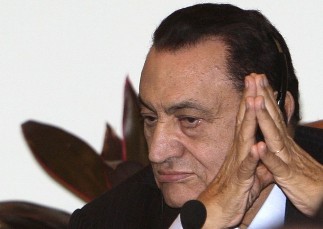Egyptian president dismisses allegations by Ethiopian PM on aiding rebels
November 25, 2010 (CAIRO) – The Egyptian president Hosni Mubarak denied claims made by Ethiopian Prime Minister Meles Zenawi this week in which he said that Cairo is supporting rebel groups in a bid to stabilize his country.

Earlier this week, Zenawi blasted the Egyptian government for its position on the Nile Basin Initiative (NBI) which aims to reallocate the shares of countries through which the river passes.
Ethiopia, Uganda, Tanzania, Rwanda and Kenya signed the NBI last May, provoking Egypt to call it a “national security” issue. The Democratic Republic of the Congo (DRC) and Burundi have so far refused to sign.
“The Egyptians have yet to make up their minds as to whether they want to live in the 21st or the 19th century,” Zenawi told Reuters in an interview last Monday, referring to the fact the original treaty was negotiated by colonial administrators.
“So the process appears to be stuck.”
The spokesperson for the Egyptian foreign ministry Hossam Zaki responding to Zenawi’s statements on Monday said that his country sticks to its legal and political positions. He further said that the Ethiopian PM made the remarks out of his frustration over the difficulties facing the Nile basin initiative.
The five signatories of the new deal have given the other Nile Basin countries one year to join the pact before putting it into action.
Egypt has repeatedly cited its “historical” right on the river which provides the country of 80 million people with 90 percent of its water needs.
The upstream countries want to be able to implement projects, in consultation with Egypt and Sudan, but without Egypt being able to exercise the veto power it was given by a 1929 colonial-era treaty with Britain.
Zenawi also accused Egypt of trying to destabilize his country by supporting several small rebel groups but said it was a tactic that would no longer work.
“If we address the issues around which the rebel groups are mobilized then we can neutralize them and therefore make it impossible for the Egyptians to fish in troubled waters because there won’t be any,” he said.
“Hopefully that should convince the Egyptians that, as direct conflict will not work, and as the indirect approach is not as effective as it used to be, the only sane option will be civil dialogue.”
The Ethiopian premier stressed that Egypt could not win a war with Ethiopia over the River Nile. Pro-government media have often stated that any attempts to reduce Egypt’s share of the water amounts to a declaration of war.
“I am not worried that the Egyptians will suddenly invade Ethiopia,” Zenawi said. “Nobody who has tried that has lived to tell the story. I don’t think the Egyptians will be any different and I think they know that.”
Ugandan President Yoweri Musievini in July called for a scheduled November meeting of the nine countries to be attended by heads of state. Meles said that would not happen now.
The last meeting of all sides ended in stalemate and angry exchanges between water ministers at a news conference in Ethiopian capital Addis Ababa.
A 1959 agreement between Egypt and Sudan — following Sudan’s independence in 1956 — allocated 55.5 billion cubic metres of the Nile to Egypt, and 18.5 billion to Sudan, a combined total of 87 percent of the Nile flow.
(ST)

Shadrack Nuer Machut
Egyptian president dismisses allegations by Ethiopian PM on aiding rebels
Hi! Hosni Mubarak of Egtpt, you’ve been in power with great supports to Islamic countries hence the civil war in Sudan was a root-based of your decisions. Sudan is governed indirectly by foreign Islaamic rulers of which Bashir is inclusuve. H.E Omar al Bashir is a foreigner, in fact all Arabs. Besides, Ethiopia’s division into Eriterea and Addis Ababa was from Egyptian polical views as concerned with the treaty between Sudan of Bashir and those insurgents from Eriterea against Egyptian gov’t. Bashir on the hand is a very good friend to Hosni and this made Mubarak supportive in combating SPLA/SPLM of Southern Sudan both financially and politically .